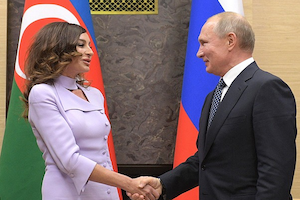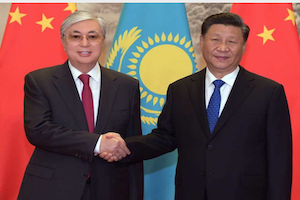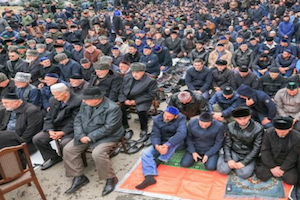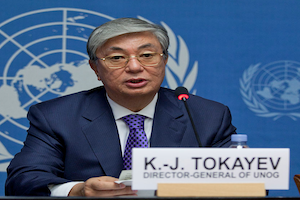Azerbaijan-Russia Relations Warm Up
By Natalia Konarzewska
February 3, 2020, the CACI Analyst
The end of 2019 saw increasing diplomatic activity between Azerbaijan and Russia, at a time when Russia wants to strengthen its profile in Azerbaijan and bring the country closer to Moscow-promoted multilateral initiatives. This is partly due to Azerbaijan’s increasing geopolitical importance to the West and China, being a key participant in the Southern Gas Corridor and a prospectively important one in the Belt and Road initiative (BRI). Russia also wants Azerbaijan to counterbalance its traditional South Caucasus ally Armenia, whereas Azerbaijan expects Russia’s assistance in resolving the Nagorno-Karabakh conflict, which is nevertheless unlikely to materialize.

China's Soft Power in Central Asia
By Nurlan Aliyev
December 19, 2019, the CACI Analyst
On October 17-18, 2019, the 7th China-Central Asia Cooperation Forum, was held in Nanning, Guanxi province. The goal of the Forum was to further strengthen ties between China and the countries of Central Asia. Aside from its economic and security related interests in the region, China is also hoping to improve its image with the help of soft power influences, among populations where Sinophobic sentiments are strong. Despite several reports and information on Chinese projects with this aim, the question remains how effective China’s soft power in Central Asia really is.

Kazakhstan's President Visits China Amid Troubles at Home
By Natalia Konarzewska
November 12, 2019, the CACI Analyst
On September 11-12, Kazakhstan’s new President Kassym-Jomart Tokayev paid his first official visit to China, aiming to upgrade bilateral ties and generate more Chinese investment in the country. Yet the official rosy picture of flourishing bilateral relations is clouded by the plight of ethnic Kazakhs inhabiting China’s Xinjiang region and the social and environmental concerns surrounding Chinese investments in Kazakhstan. For the past several years, China’s economic clout in the country has been growing but social attitudes towards China have simultaneously deteriorated rapidly, resulting in a rise of anti-Chinese sentiment and protests – the latest taking place in Kazakhstan’s major cities in early September. Moreover, Kazakhstan is undergoing a political transition process which makes the country even more vulnerable to the strong influence of its eastern neighbor.

Emerging North Caucasus Civil Society Presents New Challenges for Authorities
By Neil Hauer
November 8, 2019, the CACI Analyst
The summer of 2019 saw a crackdown on civil society across the North Caucasus. Ingushetia experienced the most severe repressions, with more than 30 individuals still detained, but Dagestan and Kabardino-Balkaria experienced arrests as well. The proximate causes of the crackdown varied among the three republics, but all reflected the fact that a region-wide civil society has flourished since the near-end of the former Islamist insurgency. Authorities are evidently unprepared to deal with this new challenge, and forceful measures against their new, nonviolent opponents have proven ineffective at best.

Kazakh Anti-Chinese Protests and the Issue of Xinjiang Detention Camps
By Elzbieta Pron and Emilie Szwajnoch
October 31, 2019, the CACI Analyst
On September 21, another wave of popular anti-Chinese protests burst in Kazakhstan’s two main cities – Nur-Sultan (formerly Astana) and Almaty. During the demonstrations, Uyghur protesters joined Kazakh activists and jointly voiced their demands regarding Kazakhstan relationship with China. However, the issue of Kazakhs and Uyghurs detained in Xinjiang camps has been sidelined as a broader agenda has taken charge and the protests been overtaken by emotional anti-Chinese sentiments. While the official Kazakh response to the problem of Xinjiang camps has been very limited, yet the most active among Central Asian states, the collective voice of protesters is hardly going to have any effect on politics.






 Book S. Frederick Starr and Svante E. Cornell,
Book S. Frederick Starr and Svante E. Cornell,